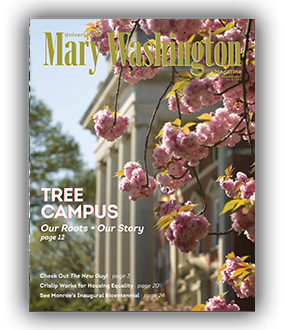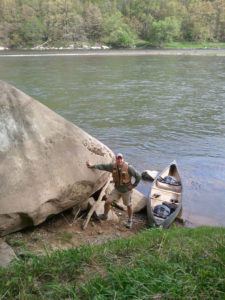By Laura Moyer
David Preston ’94 leafed through folios at the UK National Archives in London and came across something startling. There, apparently overlooked by generations of scholars, was an account by an Iroquois warrior who had traveled with George Washington as hostilities brewed between the British and French empires in America.
The unnamed Iroquois described the Jumonville Affair, a 1754 skirmish in the Pennsylvania woods considered to be the start of the French and Indian War. The warrior’s account revealed a surprising new detail: Washington, then a 22-year-old lieutenant colonel in the Virginia regiment, personally fired the war’s first shot.
That account and other newly discovered historic documents are central to Preston’s 2015 book Braddock’s Defeat: The Battle of the Monongahela and the Road to Revolution.
Published by Oxford University Press, Braddock’s Defeat has won several awards including the $50,000 Guggenheim-Lehrman Prize in Military History. It also succeeds as a good read, appealing as much to a popular audience as an academic one.
The book was a 10-year project for Preston, who majored in history at Mary Washington and is now the Westvaco Professor of National Security Studies at The Citadel in Charleston.
At first he planned a different book, using the Battle of the Monongahela as a starting point for character studies of Washington and other veterans of that battle who went on to win the Revolutionary War. But Preston came to see the battle in a new light, one at odds with accepted history.
British Gen. Edward Braddock, who died of his wounds after the battle, had been portrayed as arrogant and ill-prepared. But Preston saw Braddock as a solid leader beset by obstacles: an understaffed fighting force more practiced at drill than combat; political squabbles within the Colonies; a hellish route to battle; and some spectacularly bad luck.
Preston decided to retell the Battle of the Monongahela objectively and completely. He mined unpublished sources, drawing out for the first time the French and Indian sides of the story. He used modern knowledge of combat physiology and psychology to explain British soldiers’ breakdown of discipline during the terrifying battle. He canoed the rivers and creeks that brought the French to the Ohio Valley.
And he walked much of Braddock’s Road from Winchester, Virginia, to the site of the battle near Pittsburgh. “It was really an epiphany,” Preston said. He realized that despite Braddock’s disastrous defeat, his well-engineered military road across the Appalachians was a victory that opened the western frontier to British expansion after the war.
The Pittsburgh area is home for Preston, who grew up immersed in local stories of George Washington, the French and Indian War, and the American Revolution.
At Mary Washington, professors Bruce O’Brien, Roger Bourdon, Claudine Ferrell, and the late Richard Warner challenged and encouraged him. Exceptional classmates motivated him, too, including Jeff McClurken ’94, now a UMW professor of history and American studies.
For his senior thesis, Preston dug through British archives on a student trip O’Brien led to London. The experience solidified Preston’s love of research and foreshadowed his exciting Washington discovery two decades later.
Preston earned master’s and doctoral degrees from the College of William and Mary before beginning his teaching career at The Citadel. He and wife English are parents of Vivian, Nathanael, and Alistair.
The success of Braddock’s Defeat brought speaking engagements across the country, which The Citadel and his family have handled with good grace, Preston said. Now, though, he’s turning his attention back to research and writing – a sequel to Braddock’s Defeat is in the works.

